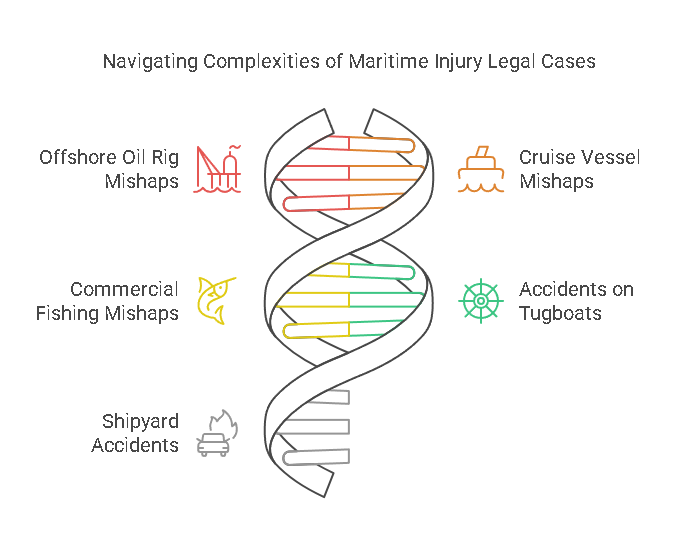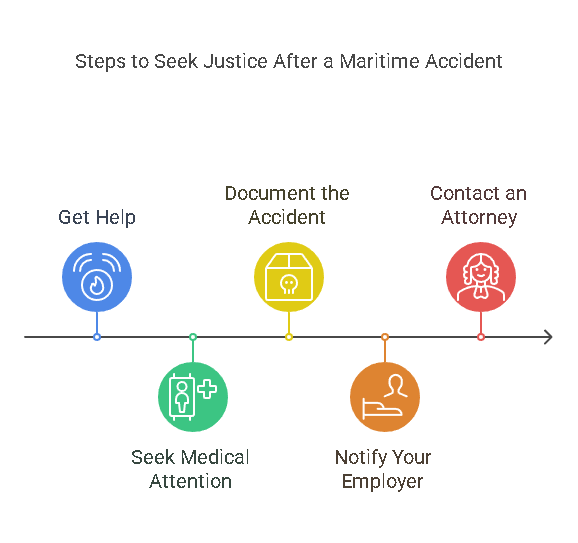After a maritime accident, the stress of recovery can be overwhelming, especially when you don’t know where to turn for help. The legal process can feel complicated and confusing. Our maritime accident lawyers in Chicago are here to make things easier for you.
We work hard to get you the compensation you deserve for medical bills, lost wages, and pain. With our expert guidance, we’ll help you through every step, ensure your rights are protected, and you get the justice you deserve.
How Do Maritime Lawyers Help Your Legal Process
Facing a maritime accident is overwhelming. You’re left with injuries, financial worries, and unanswered questions. Chicago Injury Lawyer guides you through legal battles, secures compensation, and ensures your rights are protected.
Investigate Incidents:
After an accident, it’s hard to know what happened. Our work injury lawyers dig deep to uncover facts, identify causes, and build a strong case for your claim.
Gather Evidence:
Lost documents or missing proof can ruin your case. We collect witness statements, medical records, and reports to ensure nothing is overlooked in your fight for justice.
Negotiate Settlements:
Fair compensation feels impossible when insurers play hardball. Our lawyers negotiate aggressively to secure the settlement you deserve, covering medical bills, lost wages, and more.
Represent in Court:
Court cases can feel intimidating and confusing. Our legal experts stand by your side, presenting evidence and fighting for your best outcome in front of a judge.
Types of Maritime Cases Handled by Our Maritime Injury Attorneys
Getting hurt at sea can turn your life upside down. From ship collisions to offshore injuries, maritime accidents are complex and multifaceted. Our lawyers specialise in resolving these cases, fighting for your justice and rightful compensation.
Offshore Oil Rig Mishaps
Offshore oil rigs are dangerous due to heavy machinery and complex processes. A small error, such as faulty equipment or negligence, can have catastrophic consequences, including major oil spills.
Cruise Vessel Mishaps
Cruise ship accidents include capsizing, weather-related problems, or onboard fires caused by negligence. Such incidents can disrupt vacations and put passengers and crew at serious risk.
Commercial Fishing Mishaps
Fishing trips can turn dangerous due to severe weather or accidental falls overboard. Even experienced fishermen face risks that can lead to life-threatening situations.
Accidents on Tugboats
Tugboats guide large ships into docks, but limited visibility or pilot errors can cause serious accidents. These mishaps put both tugboats and large vessels at risk.
Grounding of Ships
Ship grounding happens when the hull scrapes the ocean bed. It damages the ship, disrupts marine life, and endangers the crew aboard the vessel.
Crane Mishaps
Marine crane operations are risky due to faulty equipment or worker inexperience. Mishaps can cause severe injuries or long-term disabilities for workers handling cranes.
Accidents in Shipyards
Shipyards are high-risk zones where welding accidents and toxic fume inhalation are common. Workers often face life-changing injuries during ship assembly and construction.
Cargo Hauling Accidents
Barge accidents occur due to limited manoeuvrability or faulty towing equipment. These mishaps are often caused by inexperience or defective towing cables, leading to severe damage.

Major Injuries After a Maritime Accident
A maritime accident can leave you with serious injuries that change your life. If it’s a broken limb, spinal injury, or brain damage, these injuries often require long-term care. Our experienced lawyers help you navigate the legal process, ensuring you get the compensation you need to rebuild your life:
| Type of Injury | Potential Consequences |
| Head Injuries | Fractures, dislocations, bursitis, and tears in the glenoid labrum |
| Broken Limbs | Fractures, impaired mobility, potential for extended recovery |
| Lost Limbs/Amputation | Permanent disability, emotional trauma, loss of livelihood |
| Shoulder Injuries | Severe skin damage, scarring, and potential for infections |
| Spinal Cord Injuries | Paralysis, chronic back pain, reduced mobility |
| Burns | Severe skin damage, scarring, and potential for infections |
| Hearing Loss | Partial or total hearing loss, tinnitus (ringing in the ears) |
| Eye Injuries | Vision loss, corneal damage, chronic eye pain |
| Repetitive Strain Injuries | Tendonitis, chronic joint pain, reduced work capacity |
Who Could Be Liable for Maritime Accident Injuries
After a maritime accident, it can be confusing to figure out who is responsible for your injuries. The liable party could be your employer, the vessel owner, or a company that provided faulty equipment. Our lawyers will help hold the right parties accountable for their negligence and ensure you receive the justice you deserve.
- Shipowner: Shipowners are responsible for maintaining safe conditions on the vessel. They can be held accountable for accidents if they fail to keep the ship in good condition or provide proper training.
- Crew Members: Crew members must follow safety rules and look out for each other. If a crew member’s actions, such as ignoring safety procedures, cause an accident, they may be held responsible for the injuries.
- Port Authorities: Port authorities are responsible for ensuring the safety of the docks and loading areas. They could be liable for accidents if they neglect safety, such as leaving obstacles or hazards.
- Equipment Manufacturers: If equipment, such as cranes or winches, breaks due to poor design or manufacturing, the company that made the equipment may be held responsible for the injuries caused by that faulty equipment.
- Third-Party Contractors: Contractors who work on the vessel or in the port are responsible for doing their jobs safely. They may be held liable if their actions cause an accident or harm.
How Should I Seek Justice After a Maritime Accident
After a maritime accident, the physical and emotional toll can be overwhelming. The effects of such accidents often leave you struggling with long-term injuries and uncertainty. In these challenging times, our lawyers are here to guide you every step of the way and help you secure your rights.
Step 1: Get Help
After a maritime accident, your priority is to get help. If you’re injured, ask for assistance from nearby workers, and if needed, contact emergency services for immediate support, especially if you’re on the water or docks.
Step 2: Seek Medical Attention
Your health should always come first. If you’re out at sea, get first aid and transport to a hospital when possible. For injuries on land, call 911 if necessary or go to the emergency room with help from coworkers or a supervisor.
Step 3: Document the Accident
It’s crucial to gather evidence for your case. Take photos of dangerous conditions or faulty equipment, get witness statements, and keep track of your medical records. The more evidence you have, the stronger your claim will be.
Step 4: Notify Your Employer
Let your employer know about the accident as soon as you can. It is an essential step for filing claims and ensuring you receive the benefits and compensation you are entitled to under the law.
Step 5: Contact an Attorney
Reach out to a maritime accident lawyer right away. They can help you navigate the complex legal system, protect your rights, and ensure you get the compensation you deserve for your injuries.

Maritime Accident Lawyer Cost Calculator
Estimated Total: $0
Disclaimer: This calculator provides only a rough estimate. Actual legal and service fees may vary based on case complexity, region, and other factors. Please consult a licensed maritime attorney.
Legal Navigations for Maritime Accident Injury in Chicago
The first challenge after a maritime accident is navigating the complex legal landscape. Maritime laws are complex, which sometimes makes it hard to get the justice you deserve. Our experienced lawyers guide you through the process, ensuring you understand your rights and fight for fair compensation.
i) Jones Act
The Jones Act might protect you if you’re a crew member on a boat or vessel and get injured while working. This federal law allows you to sue your employer for injuries caused by their negligence.
Whether on an offshore drilling rig, barge, or other movable vessels, your employer must pay your medical bills and a daily allowance while you recover. You can also seek compensation for pain, lost wages, and other damages if the vessel was unsafe or your employer was careless. The Jones Act ensures seamen’s rights are protected across the country.
ii) Longshore and Harbour Workers’ Compensation Act (LHWCA):
The Longshore and Harbour Workers’ Compensation Act helps maritime workers who aren’t classified as seamen, like longshoremen and harbour workers. This law provides compensation, medical care, and rehabilitation services if you’re injured while working on or near navigable waters.
The LHWCA covers workers who load, unload, repair, or build vessels. It’s a federal law managed by the Department of Labour, ensuring you get the help you need if you’re hurt in these areas.
ii) Personal Injury Claim:
In Illinois, under 735 ILCS 5/13-202, you have two years to file a personal injury lawsuit if you’re injured at work. The clock starts when you realise you’re hurt, and if your injury shows up later, the “discovery rule” allows you to file up to two years after discovering it.
You can get compensation for medical bills, lost wages, future earnings, and rehabilitation. You can also receive money for pain, suffering, emotional distress, and loss of quality of life. To win, you must prove the other party was negligent.
iii) Wrongful Death Act
Under the Wrongful Death Act, if a maritime worker dies due to a work-related injury, their family has two years to file a claim.
The time limit typically begins on the date of death. Compensation can include funeral costs, medical expenses, lost wages, and damages for loss of consortium, grief, or emotional suffering. In some cases, punitive damages may also be awarded for intentional or extreme misconduct.
What Makes Our Advocacy Stand Out in Chicago
Feeling unheard after a maritime accident is frustrating. Our Chicago Maritime lawyers offer deep knowledge, personal care, and relentless dedication to your case. Here is what makes us stand out:
Specialised Expertise:
Maritime laws are tricky and unique. Our lawyers specialise in this field, with the skills to handle complex cases. It ensures you get the best chance for success.
Proven Track Record:
You need a lawyer who has a proven track record of success. We’ve helped many people get the money they deserve. This demonstrates our expertise in handling maritime cases.
Client-Centred Approach:
We understand your struggles and always prioritise your needs. Our team listens, supports you, and keeps you updated, so you never feel alone during the legal process.
Quick Action:
Time is crucial after a maritime accident. Our lawyers get to work right away, collecting evidence and filing papers fast. This helps avoid delays and strengthens your case.
Book a Consultation With Us: It’s Free
If you or a loved one has been injured in a maritime accident, you don’t have to face it alone. Our experienced maritime accident lawyers in Chicago are ready to help. Contact us for a FREE consultation today!
Frequently Asked Questions
How long do maritime accident cases take to resolve?
Each case is unique, but most maritime accident cases typically take several months to resolve. We’ll keep you updated and work quickly to get the best result for you.
Can I still file a claim if the accident happened a while ago?
Yes, you can still file a claim! However, it’s essential to act quickly, as there are time limits for filing maritime accident cases. Contact us for guidance.
Do I need to go to court for a maritime accident case?
Not always. Many cases are settled without going to court. However, if a fair settlement can’t be reached, our lawyers are ready to fight for you in court.



